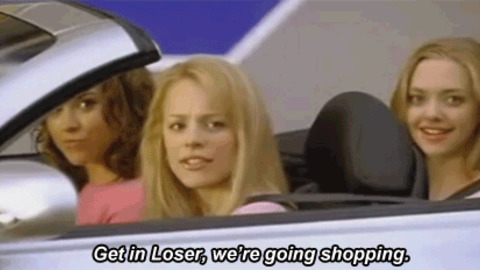Every so often, a movie comes out that defines a generation. Mean Girls was one of those "definitive" movies of the 2000s that reminded us of the horrors of high school cliques. Of course, the movie didn't start out the way. Actually, within the first 10 minutes of the movie, the movie watcher may think Cady is fortunate to have been selected by the Plastics to sit with them. I remember the very first time I saw Mean Girls, I thought "wow, I wish I had been chosen by the popular girls to sit with them when I came new to my high school." And by the way, I totally related to the whole "new girl" status-thing because I, myself, had moved in high school, and was the "new girl." However, my first day at lunch didn't exactly involve being chosen by the popular clique to sit with them, so I always felt that Cady was extremely privledged to be bestowed with such an opportunity. Cady should find her status empowering, but as the movie progresses we realize that life in the Queenbee's court isn't so amazing after all.
In other words, Mean Girls just so happens to be a shining example of neo-marxist rhetorical perspective. Here's why.
Neo-marxist perpsective exposes "how material conditions & economic practices shape dominant ideology regarding taken-for-granted assumptions about who ought to be and who ought not to be empowered." (Sellnow, 115 ) Neo marxism is all about ideology, that things ought to be a certain way based on "taken-for granted norms & values." (Sellnow, 117) Hegemony privileges a "dominant group's ideology over the that of other groups." (Sellnow, 117) Critical rhetoric frees the individuals who are not empowered by exposing truths about "how the norms, practices, and values of the dominant group are oppressing them." (Sellnow, 117) Whenever someone seeks to "challenge the status quo in terms of power" (Sellnow, 118) their actions are "percieved as abnormal, undesirable, or even wrong." (Sellnow, 118)
In terms of Mean Girls, the hegemony is the popular clique. Their group's ideology is dominant all over the school. The movie script uses critical rhetoric to expose truths about how the dominant group is oppressing the other group (the non popular) In the case of the movie, Cady's character uses critical rhetoric to expose truths about "how the norms, practices and values of the dominant group" are oppressing her, and others.
Preferred readings reinforce "the status quo ideology about empowerment by proposing taken-for-granted assumptions as common sense." (Sellnow, 119) In other words, when we watch a TV show, or see movies we (the audience) expect the good looking couple to automatically live in a nice home, drive a nice car, etc. We automatically percieve that as normal without thinking twice about it. Sometimes, the "ideological argument about empowerment is couched within what seems to be-at least at the surface-an oppositional argument."(Sellnow, 119)
In the case of Mean Girls, we (the audience) expect the popular girls to be nice, and to be friends-til-the-end with each other. We take it for granted that the popular girls have the good looking boyfriends, drive nice cars, have manicured nails and expensive clothes, etc.
The movie uses "occluded preferred readings" ( Sellnow, 119) to make an oppositional argument about empowerment. In the case of the movie, Cady is empowered by exposing the truths of the clique. She provides the audience with an "alternative worldview about empowerment." (Sellnow, 119) She does not thrive in the popular clique. The popular girls are not her real friends, even though they are perceived to be her friends. Audience members agree that life in Cady's situation is desirable, but at the same time, it is undesirable. The movie makes us question why would we want to be popular if only to have "fake friends?" The movie also explores an oppositional reading because it challenges "the dominant ideology with regard to taken-for-granted beliefs about empowerment." (Sellnow, 120 ) The movie does this through subverted oppositional reading by rejecting the "hegemony outright." (Sellnow, 120) Cady rejects the notion of the clique by going against it, and exposing the cliques secrets and tearing it apart, instead of submitting to the clique and going along with their ways, and being their friend. The movie also features radical feminist perspective as well. In the movie, pretty popular girls are viewed as behaving a certain way. They are viewed as the types who date, are sexually active, and dress slutty. This underlying message offers an occluded preferred reading to the audience.
And you thought Mean Girls was just a teen drama about the horrors of high school cliques.




This comment has been removed by the author.
ReplyDeleteThis is interesting analysis. When you say that the movie uses occluded preferred readings to make an oppositional argument about empowerment, do you mean the movie examines the occluded preferred reading that implies it is normalizing to expect the popular crowd to be pleasant and preferable and friendly (to each other)?
ReplyDeleteThe hegemony of the popular clique seems like it is also subject to being shaped by others kinds of hegemony, such as patriarchal ideas about how desirable women act and economic hegemonies of consumer culture (designer fashion etc.). Lots to unpack in this film.
ReplyDeletenice post, keep up with this interesting work. It really is good to know that this topic is being covered also on this web site so cheers for taking time to discuss this! Slouchy Beanie
ReplyDelete